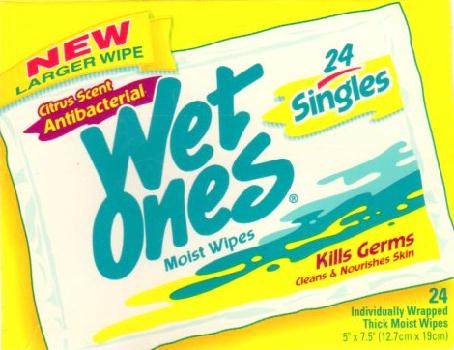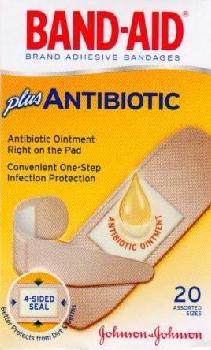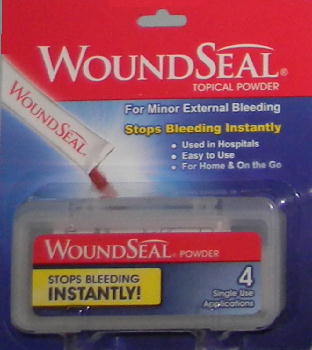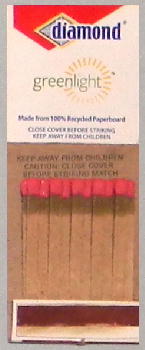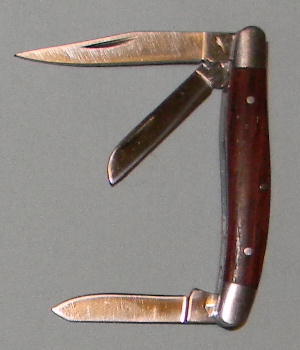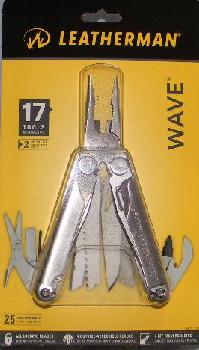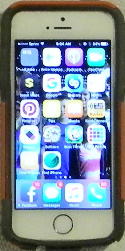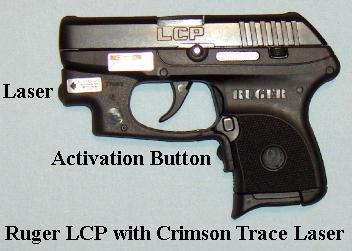
















Practical Items for Every Day Carry (EDC)
Copyright © April 1, 2016 by Robert Wayne Atkins, P.E.
All Rights Reserved.
The following is not medical advice nor is it a medical recommendation.
Please consult a licensed medical practitioner to have your medical questions answered.
Introduction
The following items should be with you whenever you leave your home. They should not simply be in your car. They should be in your wallet, or in your purse, or in your pocket, or attached to your waist belt, or on your key chain.
You almost always have your wallet and key chain with you wherever you happen to be, such as when you enter a store or a restaurant, and therefore the following items would always be with you when you are away from home.
Wallet
If the following four items are in your wallet then they will automatically be with you whenever you take your wallet with you.
- Antibacterial Wet Wipes: One individually wrapped wet wipe is about the size of a credit card. One or two foil wrapped antibacterial wet wipes should easily fit into your wallet, unless you have a lot of other stuff already in your wallet. Wet wipes can be used to clean a small wound before applying a band-aid to the wound. Or a sterile wet wipe can be placed over a larger wound and pressure applied to the wet wipe to stop or reduce the loss of blood. Individually wrapped antibacterial wet wipes are not as easy to find as they were just a few years ago. However, they can still be purchased over the internet.
- Band-aids: Put two or three sterile individually wrapped band-aids inside a small piece of aluminum foil and carefully fold the aluminum foil around the band-aids to keep them clean and to protect them from moisture. Put the band-aids in your wallet. During an unexpected serious emergency, band-aids that have a small amount of antibiotic on the pad may be more practical than band-aids without any antibiotic on them. These pre-medicated band-aids are usually sold near the normal band-aids for approximately $3 per box of 20 band-aids. I do not recommend opening an individually wrapped sterile band-aid and applying some antibiotic cream to the pad and then trying to reseal the band-aid. This defeats the purpose of the original sterile wrapper.
- Wound Seal: A band-aid is usually adequate to slow down and gradually stop the flow of blood from a small wound. However, a slightly larger wound may benefit from the application of wound closure powder. Open one individually wrapped foil pouch, sprinkle the powder on the wound and completely cover the wound area, and then apply pressure with your fingers to the powder on the wound for about 30 seconds to stop the bleeding. The powder will form a seal over the wound. Then you should immediately seek professional medical care. However, during a unexpected hard times event it may be a reasonable period of time before you receive emergency medical care. But if you have stopped the bleeding and you have protected the wound area from germs, then you should be able to survive until you receive the professional medical care you need. The above "Wound Seal" can be found in the pharmacy department of some drug stores for approximately $5.50 per box of four pouches. A single foil pouch measures 2.125 inches long by 0.75 inches wide by 0.125 inches thick.
- Matches: How many non-smokers do you know who could easily start a fire in an emergency? If you follow the advice in this article then you will probably be the only non-smoker in your group who could quickly and easily start a fire if you should suddenly and expectedly need a fire. Simply remove five or six paper matches from a matchbook of 20 paper matches. Also remove the striking strip from the matchbook. Carefully wrap the matches and the striking strip inside some aluminum foil so the heads of the matches cannot accidentally make contact with the striking strip. The aluminum foil will keep the matches clean and protect them from moisture. Put the paper matches in your wallet. Paper matches are thin and flexible and they could survive a long time in your wallet when compared to wood matches which may break and crumble with the passage of time.
Security Checkpoints: Matches are not allowed on commercial aircraft so you would need to remove them from your wallet and leave them at home or in your car before you enter an airport security checkpoint. If you forget to remove them then you can simply drop them into a trash can before you enter an airport security checkpoint. Since they are only worth a few pennies this would not be a significant loss and you could easily replace them when you arrived back home.
Key Chain
If the following two items are on your key chain then they will automatically be with you whenever you take your keys with you.
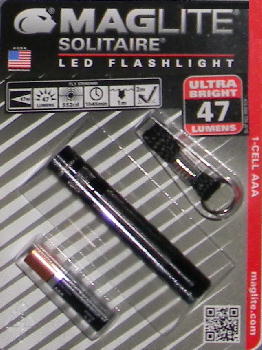
| 
|
| Flashlight 3.125" long | Whistle 1.75" long |
- LED Flashlight: Attach a small LED flashlight to your key chain. It should be bright enough to illuminate an area that is at least twelve feet or more in front of you. The flashlight needs to provide enough light in an emergency situation so you can see where you are and how to walk safely from one area to another area without tripping over something, or stepping on something, or having an accident. The flashlight should also be bright enough so you can easily read the instructions included with any emergency equipment you may find during an unexpected hard times event. An LED bulb will not need to be replaced during your lifetime and an LED bulb only consumes a fraction of the power of a non-LED bulb. The above "Maglite" LED flashlight sells for approximately $10 and it will provide 47 lumens of light out to approximately 150 feet (47 meters) for 105 minutes on a single AAA battery. Rotate the top head of the flashlight 1/2 turn to turn the flashlight on and off. (Note: During an unexpected hard times event a replacement AAA battery would probably be easier to find that a flat round battery.)
- Metal Whistle: A short round metal whistle can be extremely useful during an unexpected emergency. The shrill of a whistle can be heard for a much longer distance than a person screaming. You can also use a whistle to send an S.O.S. message or to communicate in Morse code, if necessary. The code for S.O.S. is three short blasts, pause, three long blasts, pause, three short blasts, and this informs anyone who can hear the sound of your whistle that you need emergency help. The sound will also guide rescuers to your exact location. Blowing a whistle is less fatiguing than screaming and you can blow a whistle a lot, lot longer than you can scream.
Pocket or Belt
You should also have one of the following two items in your pocket or attached to your waist belt:
- Folding Pocket Knife: Determine the maximum legal blade length established by the laws in your area for a knife that you carry in your pocket and make sure that the longest blade on your pocket knife is at least 1/16 inch shorter than the maximum legal blade length in your area. This will prevent a serious problem if a law enforcement officer decides to measure the length of your knife blade. If it is too long then you will be arrested and you may face an unsympathetic judge who will inflict the maximum possible penalty on you to make an example out of you to all the other law abiding citizens in your area (even though you may have a spotless criminal record). (Note: If necessary you should file or grind a little off the end of the blade to make sure the blade is short enough. If the blade was pointed then grind the blade so that it still has a point after you reduce its length.)
- Leatherman "Wave" Multi-tool: Instead of a folding pocket knife you could carry a Leatherman "Wave" Multi-tool (or a similar multi-tool) in its normal carrying case attached to your belt. If you select this option then please verify that multi-tools are legal for every day carry in your area because the knife blade that is standard on a multi-tool may be longer than the legal maximum knife blade specified by law in your area.
Security Checkpoints: Neither of the above items should not be attached to your key chain. The reason is because you cannot take them through a security check point at an airport or a courthouse or any other area where weapons are not permitted. However, band aids, wet wipes, flashlights, and keys are allowed through security check points. If the above items are not attached to your key chain then you can leave them at home or in your car before you enter a security checkpoint. But if either of the above two items is on your key chain then you may accidentally forget about it and you could get into some serious trouble at a security checkpoint.
You should also have both of the following items in your pockets or purse or attached to your waist belt:
- Cell Phone or Satellite Phone: During an unexpected hard times event you can use your cell phone or satellite phone to call 911 if you need assistance. If you don't need assistance then you could send a text message to your family members to let them know you are okay. During a significant hard times event text messages have a better chance of being sent and received than a standard telephone call due to the overwhelming number of people who will all be trying to use their cell phones at exactly the same time during an emergency. (Note: During a serious hard times event do not try to attach a picture to your text message because the size of the picture may prevent your text message from being sent. After you receive a reply that your original text message was received then you could try to attach a picture to another text message. However, please remember that there may be a lot of other people who are still trying to contact their family members and it might be more considerate if you wait until later to send a picture file.)
- Pocket Pistol: Get a concealed carry firearms license and always carry a loaded handgun with you wherever it is legal. Do not engage an armed assailant if you do not have to. Only engage an armed attacker to save your life or to save the life of another person. Please don't have any delusions about being a hero. Your family will miss you. If you kill or wound another person and you survive then make sure that the only thing you say afterwards is that you were in fear for your life (and maybe the life of another innocent person) and that is the only reason you used lethal force to defend yourself against the person who was trying to kill you.
Security Checkpoints: Firearms are not allowed through security checkpoints so you would need to leave your firearm at home or in your car before you enter a security checkpoint.
Other Every Day Carry Items
Socks: If you are bleeding then apply pressure to the wound to help stop or reduce the loss of blood. A simple band-aid will stop the flow of blood from a small wound and a band-aid can help to keep the wound closed. A larger wound may require pressure that you apply by hand to the bleeding area. If necessary you can remove one or both socks from your feet, tie them together, and then use them to wrap around your arm or leg to apply pressure onto a clean piece of clothing that you put over the area that is bleeding. Put your shoes back on your feet after you remove your socks because you may need to walk to safety after the bleeding stops. If it is feasible then remain stationary and wait for help to come to you. If it is feasible then lie down and elevate the spot that is bleeding so it is above your heart to help reduce the loss of blood through the wounded area. (Note: Most people don't think about their socks as being an "Every Day Carry" item that they almost always have with them and which could be used during an unexpected emergency.)
Shirt: If you survive an explosion and the air is filled with dust and debris, and you have to walk a reasonable distance to get to clean fresh air, then remove your shirt, rotate the back of the shirt to the front and secure the rear collar of the shirt above your nose and below your eyes and tie the shirt to your head using the arms of the shirt. The lower part of the shirt will still cover the top part of your body which would be important for a female. Breathe through your nose so the hairs in your nose will assist your shirt in filtering the foreign material out of the air that you inhale. When you get to clean fresh air then you can immediately remove your shirt from your face and put your shirt back on the top part of your body in its normal position so you once again look like a normal person. Then immediately blow your nose to clean the foreign particles out of your nose that are still attached to the hairs inside your nose.
Conclusion
If you have a reasonable assortment of "every day carry" items with you when you are away from home then you will increase the chances that you and your family members will survive the normal accidents that can happen to anyone, and the unusual events that happen less frequently but which are much more serious.
Respectfully,
Grandpappy.
Grandpappy's e-mail address is: RobertWayneAtkins@hotmail.com




































